
The
Bhagavad Gita
Our Books
Bhagavad Gita
Gheranda Samhita
Hatha Yoga Pradipika
Kamasutra
Shiva Samhita


Chapter One
Arjuna’s Despair

Dhritarashtra said, “When my troops and the sons of Pandu, eager to fight, were arrayed on the Kuru field, the field of law, what did they do, Sanjaya?”

Sanjaya said, “When Duryodhana, the king, saw the army of the Pandu sons assembled, he went to his teacher and spoke these words.

‘Look at this huge army of the Pandu sons, teacher, arrayed for battle by the son of Drupada, that brilliant student of yours.
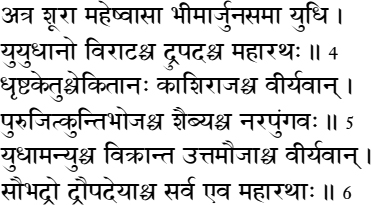
Here are the heroes, the great archers, the equals of Bhima and Arjuna in battle: Yuyudhana, Virata, and the great warrior Drupada; Dhrishtaketu, Chekitana, and the heroic king of Kashi; Purujit, Kuntibhoja, and Shaibya, bull among men; Yudhamanyu the bold and the heroic Uttamaujas; Saubhadra and the sons of Drupada—all of them great warriors.

But, best of Brahmins, hear about our superior men, the leaders of my army. I will mention them by name.
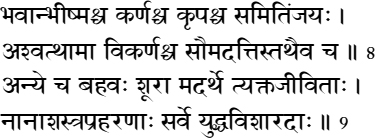
You yourself, Bhishma, Karna, and Kripa, victor in battle; Ashvatthaman, Vikarna, as well as the son of Somadatta, and many other heroes willing to sacrifice their lives for my sake, all battle-hardened wielders of many kinds of weapons.

That force, protected by Bhima, is not a match for us, but this force, protected by Bhishma, is a match for them.

Indeed, it is Bhishma you must all protect along all avenues of approach as you man your respective positions.’

In order to encourage him, grandfather, the majestic Kuru elder roared his lion’s roar and blew his conch.

Then, all of a sudden, the conches, kettledrums, cymbals, big drums, and horns were sounded: It was a tumultuous noise.

And standing on their great chariot yoked with white horses, Madhava and the son of Pandu blew their divine conches.

Hrishikesha blew his Pancajanya, Dhananjaya his Devadatta, and Wolf Belly of terrible deeds blew the great conch Paundra.

King Yudhishthira, the son of Kunti, blew his Anantavijaya; Nakula and Sahadeva, their Sughosha and Manipushpaka.
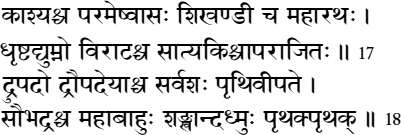
The Kashi king, the great archer, and the great warrior, Shikhandi; Dhrishtadyumna and Virata and the undefeated Satyaki; Drupada and the sons of Drupada: All together, O Lord of the Earth, as well as the mighty-armed Saubhadra, blew their conches—each and every one.

This thundering sound rent the hearts of the sons of Dhritarashtra, resounding through earth and sky.
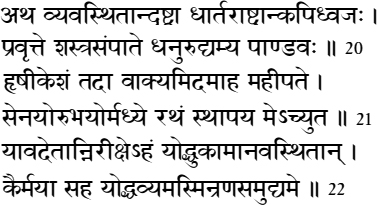
Then the ape-bannered son of Pandu, seeing the sons of Dhritarashtra lined up, lifted his bow as the clash of arms began and spoke these words to Hrishikesha, O Lord of the Earth: ‘Achyuta, station my chariot between the two armies, so that I may observe these men, standing eager for battle, with whom I must fight in this strenuous engagement.

I see these men who have assembled here, ready to fight, wanting to please the evil-minded son of Dhritarashtra in battle.’
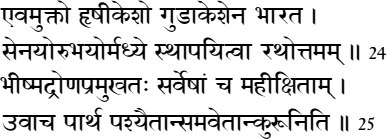
When Gudakesha had spoken to him thus, O Bharata, Hrishikesha stationed their splendid chariot between the two armies, right in front of Bhishma, Drona, and all the kings and said, ‘Son of Pritha, behold these Kurus assembled.’
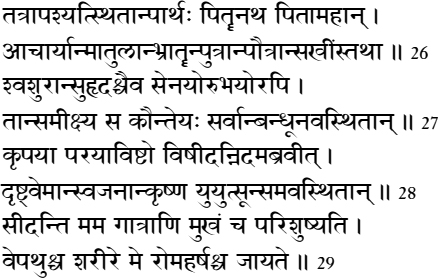
There the son of Pritha saw standing fathers and grandfathers, as well as teachers, uncles, brothers, sons, grandsons, friends, fathers-in-law, and even allies in both armies. When the son of Kunti had seen them, all these relatives arrayed, he was overcome with the greatest compassion, deeply saddened, and said this: ‘When I see my family willing and ready to fight, Krishna, my limbs falter, my mouth goes dry. There is a trembling in my body and my hairs bristle.

Gandiva slips from my hand, and as for my skin, it burns. I cannot stand firm, and my mind seems to whirl.

I see inauspicious portents, Keshava, and I see nothing good achieved by killing my family in battle.

I don’t desire victory, Krishna, nor a kingdom or pleasures. What use is a kingdom to me, Govinda? What is enjoyment or life?

For precisely those for whose sake we desire a kingdom, enjoyment, and pleasures are standing in line to battle against us, giving up their lives and riches.

Teachers, fathers, sons, yes, even grandfathers, uncles, fathers-in-law, grandsons, brothers-in-law, and other kinsmen—these I don’t want to kill, even if they kill us, Madhusudana, even for the kingdom of the three worlds, and even less for the earth.

What joy would we gain, Janardana, by killing the sons of Dhritarashtra? Only evil would accrue to us by killing these malefactors.

Therefore, we must not kill the sons of Dhritarashtra and our kinsmen. How could we become happy by killing our family?
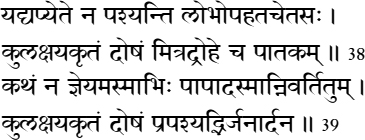
Even if they, their minds seduced by greed, do not see the wickedness of destroying the family and the crime in betraying their friends, how could we fail to know that we should turn away from this evil, we who see the wickedness of destroying the family, Janardana?

When the family is destroyed, the eternal family laws are lost, and when the law is lost, lawlessness overwhelms the whole family.
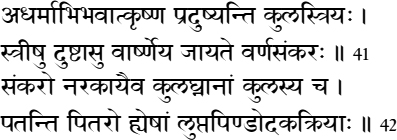
Because lawlessness prevails, Krishna, the women of the family become corrupted. When the women are corrupted, Son of Vrishni, the classes get confused, a confusion leading to hell for family and family killers. For their fathers fall, deprived of their offerings of rice balls and water.

Because of these transgressions of the family killers which cause confusion of the classes, the eternal caste laws and family laws are set aside.

We have heard, Janardana, that a place in hell is guaranteed for men who have set aside their family laws.

Alas! We have decided to do great evil, because we are ready to kill our family out of greed for the pleasures of a kingdom.

If the sons of Dhritarashtra, weapons in hand, were to kill me in battle, unresisting and unarmed, that would be better for me.’

With these words, Arjuna let go of his bow and arrows in the midst of battle and sank down in his chariot, his mind tormented by sorrow.”

Thus ends the first chapter, entitled “The Reflection upon Arjuna’s Despair,” in the instruction which teaches the sacred knowledge given by the exalted Krishna in his conversation with Arjuna, the auspicious Bhagavad Gita, which is in the work of a hundred thousand verses, the glorious Mahabharata.

Chapter Two
Theory

Sanjaya said, “Thus overcome with compassion, his eyes filled with tears in despair, Madhusudana spoke to him.

The Lord said, ‘Why has this foul delusion come over you in this critical hour, Arjuna? It is ignoble, it doesn’t lead to heaven, and it is disgraceful.

Do not succumb to cowardice, Son of Pritha. This is unworthy of you. Shake off this petty faintness of heart. Stand up, Scorcher of Enemies!’

Arjuna said, ‘How can I fight with arrows against Bhishma and Drona in battle, Madhusudana? They are worthy of homage, Enemy Slayer.

It is better to eat beggars’ food here in this world than to kill teachers of great honor. If I were to kill my teachers, who are greedy for wealth here, I would enjoy pleasures smeared with blood.

Nor do we know what is better for us, whether we win or lose. The sons of Dhritarashtra are arrayed before us. If we kill them, we shall not wish to live.

My deepest nature has been stricken by the error of compassion. With a mind confused about the law, I ask you what would be best. Tell me this for sure. I am your student. Teach me as I seek refuge in you.

For I see nothing that would dispel this sorrow of mine which desiccates my senses, even if on earth I obtained unrivaled wealth, a kingdom, yes, even sovereignty over the gods!’”

Sanjaya said, “O Scorcher of Enemies, after Gudakesha said this to Hrishikesha, he added, ‘I will not fight,’ and then fell silent.

With a hint of derision, O Bharata, Hrishikesha spoke these words to him as he sat despairing between the two armies.

The Lord said, ‘You sorrow over men you should not be sorry for, yet you address issues of learning? Wise men grieve neither for the dead nor for the living.

Never was there a time when I did not exist, nor you, nor these lords of men, and never shall any of us cease to exist hereafter.

Just as the embodied self passes through childhood, youth, and old age in this body, in the same manner, it will obtain another body. A wise man is not confused about this.

Contacts with the elements, Son of Kunti, are the source of cold, heat, pleasure, and pain. They come and go eternally. Endure them, Bharata!

The man whom they do not trouble, O Bull Among Men, the wise man for whom pain and pleasure are the same: He is fit for immortality.

There is no becoming from the nonexistent, nor any unbecoming from the existent. The boundary between these two has been perceived by those who see the basic principles.

Know that this, on which all the world has been strung, is indestructible. No one can bring about the destruction of this imperishable being.

It is these bodies of the embodied, eternal, imperishable, and unfathomable self which come to an end. Therefore fight, Bharata!

He who thinks the embodied self is a slayer, and he who imagines it is slain—neither of these understand. It does not slay, nor is it slain.

It is never born and it never dies, nor will it come to life again when it has ceased to be. It is unborn, eternal, constant, and ancient. It is not slain when the body is slain.

How does the man who knows this indestructible, eternal, unborn, and imperishable principle, Son of Pritha, have anybody killed, or kill anybody?

Like a man who has cast off his old clothes puts on others that are new, thus the embodied self casts off old bodies and moves on to others that are new.

Weapons do not cut it, fire does not burn it, water does not wet it, wind does not parch it.

It cannot be cut, it cannot be burned, it cannot even be wetted or parched. It is eternal, omnipresent, firm, immovable, everlasting.

It is unmanifest, it is inconceivable, it is said to be unchanging. Therefore, knowing it in this manner, do not mourn it.

Even if you regard it as eternally born or eternally dead, you still should not grieve over it, Mighty-armed Prince.

For to the born, death is certain—and birth is certain to the dead. Therefore, do not grieve over something that is inescapable.

The beginnings of beings are hidden, Bharata, their middle periods are visible, and their ends are hidden again. What reason is there to lament?

Someone sees it as a miracle, another speaks of it as a miracle, and yet another hears it as a miracle, but even if someone has heard of it, no one really knows it.

This embodied self in anyone’s body is always unslayable, Bharata. Therefore you should not grieve over any beings.

Yes, observe your personal law; do not waver. For there is nothing better for a warrior than lawful combat.

And when it happens of its own accord, an open door to heaven, happy are the warriors, Son of Pritha, who obtain such combat.

So, if you do not participate in this lawful battle, then you will give up your personal law and fame and incur guilt.

The world will tell of your undying shame, and for the honored, shame is worse than death.

The great warriors will think that you withdrew from battle out of fear, and you will lose the respect of those who held you in great esteem.

Your enemies will tell many unspeakable tales about you, mocking your strength. What could be worse than that?

If you are killed, you will obtain heaven; if you are victorious, you will enjoy the earth. Therefore stand up, Son of Kunti, and resolve to battle!

Treating happiness and unhappiness, profit and loss, victory and defeat alike, make yourself ready for battle! Thus you will incur no guilt.

This disposition has been explained to you in theory; now listen to it in practice. Endowed with this disposition, Son of Pritha, you will break the bonds of action.

There is no unsuccessful effort here, nor is there any backlash. Even a little of this law saves one from great distress.

In this there is a resolute disposition characterized by resolve, Joy of the Kurus. But the minds of the irresolute are endless and branch out in many directions.

This is the flowery language that the undiscerning use, those who rejoice in Vedic discussions, Son of Pritha, saying, “There is nothing else.”

Their nature is desire, and they are set upon heaven. That language gives rebirth as the fruit of actions, abounds in many different rituals, and is aimed at obtaining pleasure and power.

If the minds of such men are carried away by it, their intellectual concentration is not endowed with this resolute disposition because they are attached to pleasure and power.

The Vedas have the world of the triple properties as their subject. Stay aloof from this world of three qualities, Arjuna. Be indifferent to pairs of opposites, forever fixed in clarity, nonacquisitive, self-possessed.

As useful as a well when water is flooding everywhere, so are all the Vedas for an intelligent Brahmin.

You are only entitled to the action, never to its fruits. Do not let the fruits of action be your motive, but do not attach yourself to nonaction.

Perform your actions with mental discipline, Dhananjaya, without attachment, remaining equable in success and failure. Equanimity is called Yoga.

For action is by far inferior to a disciplined disposition, Dhananjaya. Seek shelter in your disposition! Miserable are those who are motivated by rewards.

The man whose disposition is disciplined transcends both good and bad actions in this world. Therefore prepare yourself for Yoga. Yoga means great strength in actions.

For men with disciplined minds wisely leave behind rewards born of action, and released from the bonds of birth, proceed to a stage free from sorrow.

When your mind crosses beyond the opacity of illusion, you will become indifferent to both future and past revelations.

When your mind stands steady in disregard of revelation, immovable in intellectual concentration, then you will achieve mental discipline.’

Arjuna said, ‘What is the definition of this man of steadfast wisdom, standing in concentration, Keshava? How would this steady-minded man speak, sit, and walk?’

The Lord said, ‘When a man, Son of Pritha, leaves behind all desires that come to the mind, satisfied by and in himself, then he is called a man of steadfast wisdom.

His mind is not ruffled in misfortune, he is without desire in good fortune, his passion, fear, and anger have disappeared. The steady-minded man is called a sage.

He who is indifferent in all matters, who neither rejoices nor hates whether he meets good or evil, his wisdom is well founded.

And when he withdraws his senses from their objects, like a tortoise retracting all its limbs, then his wisdom is well founded.

Sense objects disappear for the embodied soul deprived of food, except for their taste. Even the taste retreats when the soul has seen the Supreme.

For the exciting senses, Son of Kunti, forcibly steal the mind of even a learned man who exerts himself.

The disciplined man should bring them all under control and sit intent on me. For the wisdom of that man is well founded who has his senses in his power.
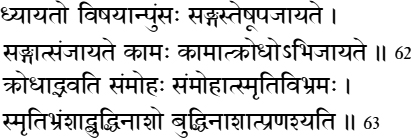
When a man contemplates sense objects, he grows attached to them. This attachment produces desire, and from desire, anger is born. Anger produces confusion, confusion produces loss of memory, loss of memory produces destruction of the mind, and because the mind is destroyed, he perishes.
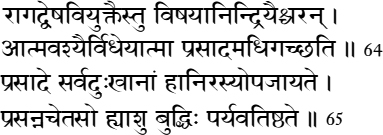
But that man attains serenity whose self is obedient, who roams among the sense objects with his senses controlled by the self, untouched by passion and aversion. In a state of serenity, all sorrows disappear for him, for the mind of the man with a serene consciousness quickly becomes steady.

A man without mental discipline has no intelligence, nor any inclination for self-knowledge, nor is there tranquility for him who does not seek self-knowledge. How could the man bereft of tranquility find happiness? For when the mind yields to the roving senses, it carries away his wisdom like the wind carries away a boat on the water.

Therefore, Mighty-armed Prince, the wisdom of that man whose senses are always withdrawn from the sense objects is well founded.

When it is night for all beings, the self-controlled man is awake. When the beings are awake, that is night for the seeing sage.

That man attains tranquility into whom all desires flow like water flows into the sea and fills it without moving it, not he who is filled with desires.

The man who abandons all desires and roams about without cravings, possessiveness, or ego-consciousness, reaches tranquility.

This is the Brahmic state, Son of Pritha! He who has obtained it is not thrown into confusion. He who remains in it, even at the moment of death, reaches the final emancipation.’

Thus ends the second chapter, entitled “The Reflection upon Theory,” in the instruction which teaches the sacred knowledge given by the exalted Krishna in his conversation with Arjuna, the auspicious Bhagavad Gita, which is in the work of a hundred thousand verses, the glorious Mahabharata.

Chapter Three
Action

Arjuna said, ‘If you think, Janardana, that disposition is better than action, then why do you urge me to such terrible action, Keshava?

It is as if you confuse my mind with self-contradictory words. So tell me unambiguously and definitively what I need to attain the supreme good.’

The Lord said, ‘In this world, I have formerly taught two alternatives, blameless Prince: the discipline of knowledge for men of intellect, and the discipline of action for men of action.

A man does not avoid karma because he ceases to undertake actions, nor does he fully reach success simply by renunciation.

Mahabharata.